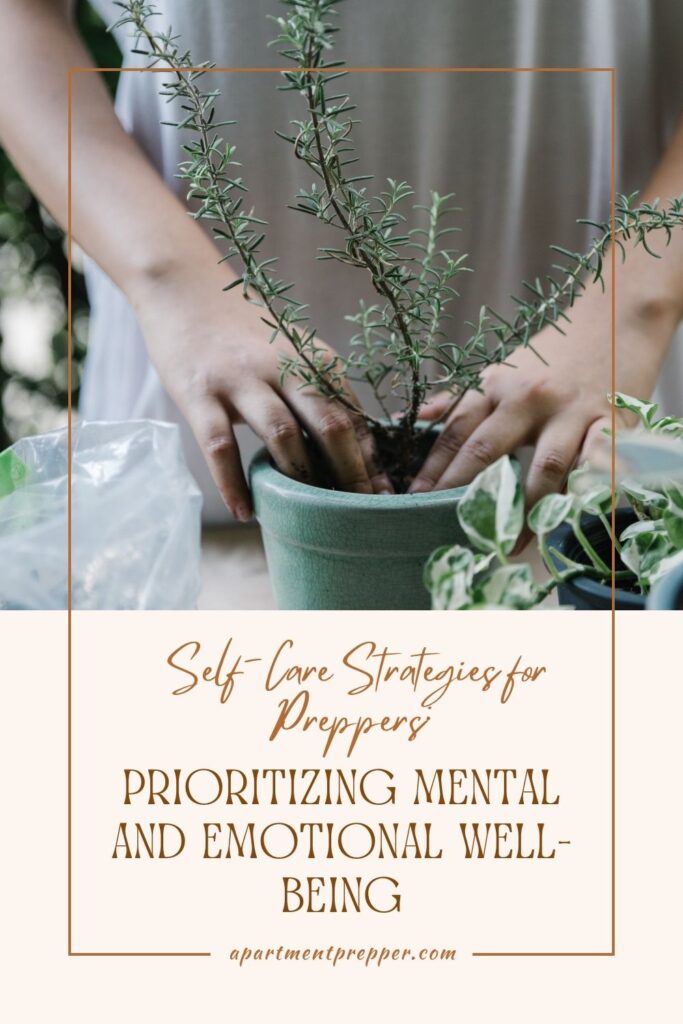Written by Bernie Carr
No one can deny there have been a lot of worrisome events lately, both domestic and internationally. Everyone I’ve talked to in the last few weeks have expressed some kind of stress and unease about things going on around them. Going to the grocery alone, dealing with high food prices is enough to cause anxiety.
Preppers often focus on physical survival: stockpiling supplies, fortifying shelters, and honing survival skills. While these aspects are undoubtedly crucial, one aspect that is sometimes overlooked is the importance of mental and emotional well-being. Apartment Preppers, in particular, face unique challenges when it comes to maintaining their mental and emotional health in a confined space. In this article, we’ll explore self-care strategies tailored to the needs of apartment preppers, helping them prioritize their mental and emotional well-being amidst the chaos of emergency preparedness.
Living in an apartment presents its own set of challenges, especially in times of crisis. Limited space, shared amenities, and proximity to neighbors can all contribute to feelings of stress and anxiety. Add the pressures of preparing for emergencies on top of daily life, and it’s easy to see how mental and emotional well-being can take a backseat. However, neglecting these aspects can have serious consequences for overall resilience and coping ability. That’s why it’s essential for apartment preppers to prioritize self-care strategies that address their mental and emotional needs.
Acknowledge Your Feelings
The first step in prioritizing mental and emotional well-being is acknowledging your feelings. It’s okay to feel anxious, overwhelmed, or scared, especially when faced with uncertainty or adversity. Allow yourself to experience these emotions without judgment or self-criticism. Journaling can be a helpful tool for processing your thoughts and feelings, providing a safe space to express yourself without fear of judgment.
Establish a Routine
Maintaining a sense of routine can provide stability and structure in uncertain times. Set aside time each day for activities that promote relaxation and self-care, such as meditation, yoga, or reading. Create a schedule that includes regular meals, exercise, and adequate sleep to support your physical and mental health. Even in the midst of chaos, having a routine can help you feel grounded and in control of your environment.
Practice Mindfulness
Mindfulness is the practice of being present in the moment, without judgment or attachment to thoughts or emotions. Incorporating mindfulness techniques into your daily routine can help reduce stress and anxiety, improve focus and concentration, and enhance overall well-being. Take time each day to engage in mindfulness practices such as deep breathing exercises, progressive muscle relaxation, or mindful walking.
Connect with Nature
Spending time in nature has been shown to have numerous benefits for mental and emotional well-being. Even if you live in an urban environment, look for opportunities to connect with nature, whether it’s taking a walk in a nearby park, tending to a small balcony garden, or simply opening your windows to let in fresh air and natural light. Connecting with nature can help reduce stress, improve mood, and foster a sense of connection to something greater than yourself.
Cultivate Social Support
Maintaining social connections is essential for mental and emotional well-being, especially during times of crisis. Reach out to friends, family members, or neighbors for support and connection. Share your concerns and feelings with trusted individuals who can offer empathy and understanding. Join online communities or local groups of like-minded individuals who share your interests and values. Building a support network can provide comfort, encouragement, and a sense of belonging.
Limit Exposure to Negative News
While it’s important to stay informed about current events and potential threats, too much exposure to negative news can take a toll on mental and emotional well-being. Set boundaries around your media consumption, limiting the amount of time you spend watching or reading news coverage. Choose reputable sources of information and prioritize quality over quantity. Focus on what you can control, rather than fixating on worst-case scenarios beyond your influence.
Practice Self-Compassion
Self-compassion involves treating yourself with kindness, understanding, and acceptance, especially in times of difficulty or failure. Be gentle with yourself and recognize that it’s okay to make mistakes or experience setbacks. Practice self-care activities that nourish your mind, body, and spirit, whether it’s taking a warm bath, indulging in a favorite hobby, or simply giving yourself permission to rest and recharge.
Seek Professional Help if Needed
If you find that your mental or emotional well-being is significantly impacted by stress, anxiety, or other concerns, don’t hesitate to seek professional help. Therapists, counselors, and mental health professionals can offer support, guidance, and resources to help you cope with challenges and develop healthy coping strategies. Many therapists offer remote sessions via phone or video conferencing, making it easier to access support from the comfort of your home.
In conclusion, self-care is an essential component of emergency preparedness for apartment preppers. By prioritizing mental and emotional well-being, you can enhance your resilience, coping ability, and overall quality of life. Incorporate self-care strategies into your daily routine, acknowledge your feelings, connect with nature, cultivate social support, and practice self-compassion. Remember that taking care of yourself is not selfish; it’s necessary for your well-being and ability to thrive, both now and in the future.
We are an affiliate of Amazon.com, which means we received a small commission if you click through one of our Amazon links when you shop, at totally no cost to you. This helps keep the lights on at the blog. Thanks!
About the author
Bernie Carr is the founder of Apartment Prepper. She has written several books including the best-selling Prepper’s Pocket Guide, Jake and Miller’s Big Adventure, The Penny-Pinching Prepper and How to Prepare for Most Emergencies on a $50 a Month Budget. Bernie’s latest e-book, FRUGAL DIY has just been released on Amazon. Her work appears in sites such as the Allstate Blog and Clark.com, as well as print magazines such as Backwoods Survival Guide and Prepper Survival Guide. She has been featured in national publications such as Fox Business and Popular Mechanics. Learn more about Bernie here.
FB: https://www.facebook.com/apartmentprepper
Instagram: https://www.instagram.com/apartmentpreppers/
Twitter: https://twitter.com/AptPrepper
YouTube: https://www.youtube.com/channel/UC7vOtdbo-wiBeBxD6puCr1Q
Patreon: https://patreon.com/apartmentprepper
Pinterest: https://www.pinterest.com/aptprepper/
Today’s societal climate not supportive of prepping. With your help, we can keep bringing you content that is often suppressed. Help keep Apartment Prepper alive.
Join me on Patreon for ad-free content.

Or Help out via Paypal



